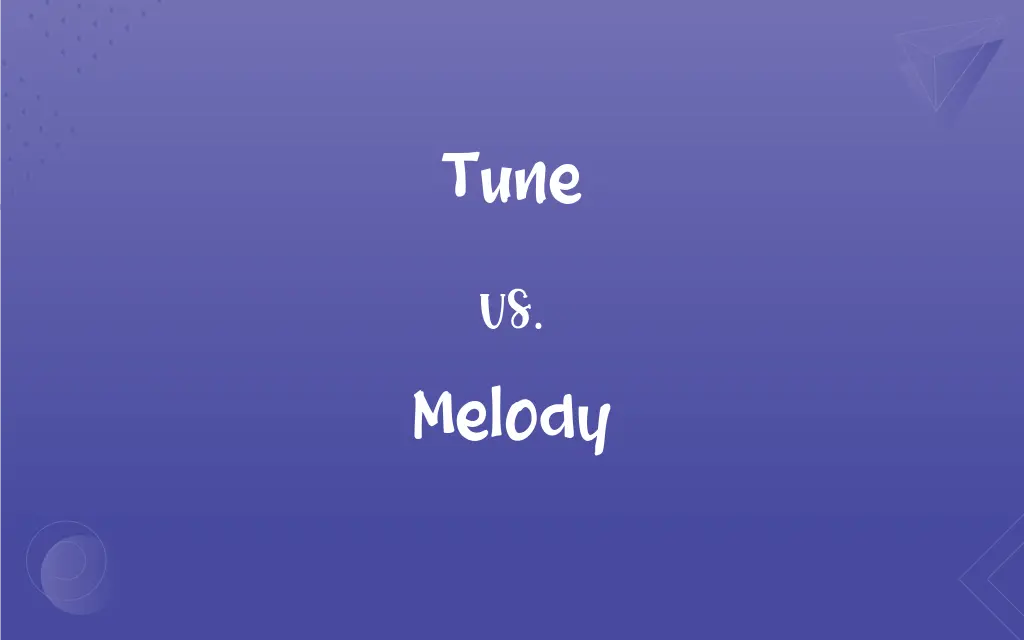Tune vs. Melody: What's the Difference?
Edited by Harlon Moss || By Janet White || Updated on October 5, 2023
A tune is a simple sequence of musical notes that is sonorous and rhythmically organized while a melody is a sequence of notes that is musically satisfying.

Key Differences
A tune refers to a series of musical notes that are perceived as a single entity, often characterized by a catchy and rhythmic pattern. It is the part of the music that one typically hums or whistles, reflecting a simple and recognizable music pattern. In contrast, melody is considered a more structured and harmonious series of notes. It holds musical aesthetics, involving rhythm, tempo, and pitch, which create a harmonious and satisfying sequence.
Tunes are often the building blocks in music, providing a foundational layer upon which other musical elements can be constructed. They are generally simple and easy to remember. Melodies, however, are usually more complex and sophisticated. They may involve variations in pitch and rhythm, requiring a deeper understanding of musical composition and arrangement.
In musical composition, a tune may be less intricate and may repeat more frequently, being the backbone of a musical piece, providing an anchor for the listener. On the contrary, a melody may involve multiple tunes and can be more dynamic, sometimes leading the musical piece and invoking various emotions through its elaborate composition.
Tunes can be seen as more colloquial and are usually the parts of a song that people remember most easily. They are essential for creating a memorable piece of music. Melodies, on the other hand, require a degree of musical knowledge and understanding, and they play a pivotal role in conveying the emotional and aesthetic aspects of the music.
While tunes are predominantly recognized by their simplicity and catchiness, melodies are the soul of the music, delivering intricate musical expressions and invoking diverse emotions, which make the music piece distinctive and aesthetically pleasing.
ADVERTISEMENT
Comparison Chart
Complexity
Generally simple
More complex and structured
Musical Role
Serves as a musical anchor
Leads the musical piece
Repetition
Repeats more frequently
May or may not have repetitions
Recognition
Easily recognizable and catchy
Recognizable, more varied
Emotional Expression
Limited
Rich, conveying diverse emotions
ADVERTISEMENT
Tune and Melody Definitions
Tune
It is a simple musical composition in harmonious sequence.
She hummed a happy tune while walking.
Melody
It refers to the dominant sequence of notes in a musical composition.
The melody was rich and filled with emotion.
Tune
It represents the musically satisfying combination of individually perceivable musical tones.
The tune of the lullaby was soothing.
Melody
Melody involves varying pitch, rhythm, and tempo to create a satisfying sequence.
The complex melody was both haunting and captivating.
Tune
It is a melody that is easy to recognize and remember.
The tune was so infectious that everyone started humming along.
Melody
It is a structured musical composition that conveys emotion and aesthetic qualities.
The melody was crafted meticulously to invoke profound feelings.
Tune
A melody, especially a simple and easily remembered one.
Melody
A pleasing succession or arrangement of sounds.
Tune
A song.
Melody
Musical quality
The melody of verse.
Tune
The state of being in correct pitch
Sang out of tune.
Played in tune with the piano.
Melody
A rhythmically organized sequence of single tones so related to one another as to make up a particular phrase or idea.
Tune
(Obsolete) A musical tone.
Melody
Structure with respect to the arrangement of single notes in succession.
Tune
Concord or agreement; harmony
In tune with the times.
Melody
The leading part or the air in a composition with accompaniment.
Tune
(Archaic) Frame of mind; disposition.
Melody
A poem suitable for setting to music or singing.
Tune
(Electronics) Adjustment of a receiver or circuit for maximum response to a given signal or frequency.
Melody
A sequence of notes that makes up a musical phrase
Tune
(Music) To put into proper pitch
Tuned the violin.
Melody
A sweet or agreeable succession of sounds.
Lulled with sound of sweetest melody.
Tune
(Archaic) To utter musically; sing.
Melody
A rhythmical succession of single tones, ranging for the most part within a given key, and so related together as to form a musical whole, having the unity of what is technically called a musical thought, at once pleasing to the ear and characteristic in expression.
Tune
To adjust (an electronic receiver) to a desired frequency.
Melody
The air or tune of a musical piece.
Tune
To adjust (an electronic circuit) so as to make it resonant with a given input signal.
Melody
A succession of notes forming a distinctive sequence;
She was humming an air from Beethoven
Tune
To adjust (an engine, for example) for maximum usability or performance.
Melody
The perception of pleasant arrangements of musical notes
Tune
To adjust the wavelength output of (a laser).
Melody
A melody is a harmonious sequence of notes, pleasing to the ear.
The melody of the song was enchanting and beautiful.
Tune
To become attuned.
Melody
Melody is the tuneful and harmonious arrangement of notes in music.
The composer created a melody that was timeless and unforgettable.
Tune
A melody.
Tune
A song, or short musical composition.
Tune
(informal) The act of tuning or maintenance.
Your engine needs a good tune.
Tune
The state or condition of being correctly tuned.
Your engine is now in tune.
This piano is not in tune.
Tune
(obsolete) Temper; frame of mind.
Tune
(obsolete) A sound; a note; a tone.
Tune
(obsolete) Order; harmony; concord.
Tune
Used to show appreciation or approval of a song.
You heard the new Rizzle Kicks song? — Tune!
Tune
To adjust (a musical instrument) so that it produces the correct pitches.
To tune a piano or a violin
Tune
To adjust or modify (esp. a mechanical or electrical device) so that it functions optimally.
Tuning the engine gave me an extra twenty horsepower.
Tune your mind, and anything becomes possible.
Tune
To adjust the frequency on a radio or TV set, so as to receive the desired channel.
Tune to Channel 6 for all your favourite daytime shows.
Tune
Of faculties, senses, etc.: to adapt to or direct towards a particular target.
My ears were tuned to the sounds of the forest.
Tune
To make more precise, intense, or effective; to put into a proper state or disposition.
Tune
To attune; to adapt in style of music; to make harmonious.
Tune
(transitive) To give a certain tone or character to.
Tune
(obsolete) To sing with melody or harmony.
Tune
To be impudent towards; to cheek.
Are you tuning me?
Tune
(fandom slang) to adjust the parameters of singing voice synthesis software such as VOCALOID (in order to achieve certain singing techniques, increase the human quality of the voice, etc.)
Tune
A sound; a note; a tone.
Tune
A rhythmical, melodious, symmetrical series of tones for one voice or instrument, or for any number of voices or instruments in unison, or two or more such series forming parts in harmony; a melody; an air; as, a merry tune; a mournful tune; a slow tune; a psalm tune. See Air.
Like sweet bells jangled, out of tune and harsh.
Tune
Order; harmony; concord; fit disposition, temper, or humor; right mood.
A child will learn three times as much when he is in tune, as when he . . . is dragged unwillingly to [his task].
Tune
To put into a state adapted to produce the proper sounds; to harmonize, to cause to be in tune; to correct the tone of; as, to tune a piano or a violin.
Tune
To give tone to; to attune; to adapt in style of music; to make harmonious.
For now to sorrow must I tune my song.
Tune
To sing with melody or harmony.
Fountains, and ye, that warble, as ye flow,Melodious murmurs, warbling tune his praise.
Tune
To put into a proper state or disposition.
Tune
To form one sound to another; to form accordant musical sounds.
Whilst tuning to the water's fall,The small birds sang to her.
Tune
To utter inarticulate harmony with the voice; to sing without pronouncing words; to hum.
Tune
A succession of notes forming a distinctive sequence;
She was humming an air from Beethoven
Tune
The property of producing accurately a note of a given pitch;
He cannot sing in tune
The clarinet was out of tune
Tune
The adjustment of a radio receiver or other circuit to a required frequency
Tune
Adjust for (better) functioning;
Tune the engine
Tune
Of musical instruments;
My piano needs to be tuned
Tune
A tune is a catchy sequence of musical notes.
The tune of the song was very catchy and memorable.
Tune
Tune refers to the adjustment of musical instruments to the correct pitch.
He tuned his guitar before the performance.
FAQs
Is melody more about emotion than tune?
Generally, melodies convey more emotion and are more varied than tunes.
Can a song have multiple tunes and melodies?
Yes, a song can have multiple tunes and melodies interwoven.
Is a tune simpler than a melody?
Yes, tunes are generally simpler and more straightforward than melodies.
Can a melody exist without a tune?
A melody can be composed of multiple tunes, but it could exist without a recognizable or catchy tune.
Is melody more important than tune in music composition?
Both are important, but melody often plays a more pivotal role in conveying emotion and aesthetic.
Can a tune be a melody?
Yes, a tune can be considered a type of melody, especially if it is harmonious and satisfying.
Can tunes be harmonious?
Yes, tunes are often harmonious and pleasing to the ear.
Is a tune always repetitive?
Often, tunes are repetitive, but they are not required to be.
Do tunes and melodies need lyrics?
No, both tunes and melodies can exist with or without lyrics.
Is a melody always the lead part of the composition?
Typically, but not always, as it depends on the composition structure.
Are tunes easy to remember?
Generally, tunes are easier to remember due to their simplicity and repetition.
Do tunes and melodies both require musical knowledge to create?
Creating sophisticated tunes and melodies generally requires a degree of musical knowledge.
Can melodies be intricate?
Yes, melodies can be intricate, involving variations in rhythm, pitch, and tempo.
Can the terms tune and melody be used interchangeably?
While they have different nuances, they are sometimes used interchangeably in casual conversation.
Is it essential for a melody to be pleasing to the ear?
Typically, melodies are pleasing and satisfying, but they can also evoke a range of emotions, including dissonance.
About Author
Written by
Janet WhiteJanet White has been an esteemed writer and blogger for Difference Wiki. Holding a Master's degree in Science and Medical Journalism from the prestigious Boston University, she has consistently demonstrated her expertise and passion for her field. When she's not immersed in her work, Janet relishes her time exercising, delving into a good book, and cherishing moments with friends and family.
Edited by
Harlon MossHarlon is a seasoned quality moderator and accomplished content writer for Difference Wiki. An alumnus of the prestigious University of California, he earned his degree in Computer Science. Leveraging his academic background, Harlon brings a meticulous and informed perspective to his work, ensuring content accuracy and excellence.































































